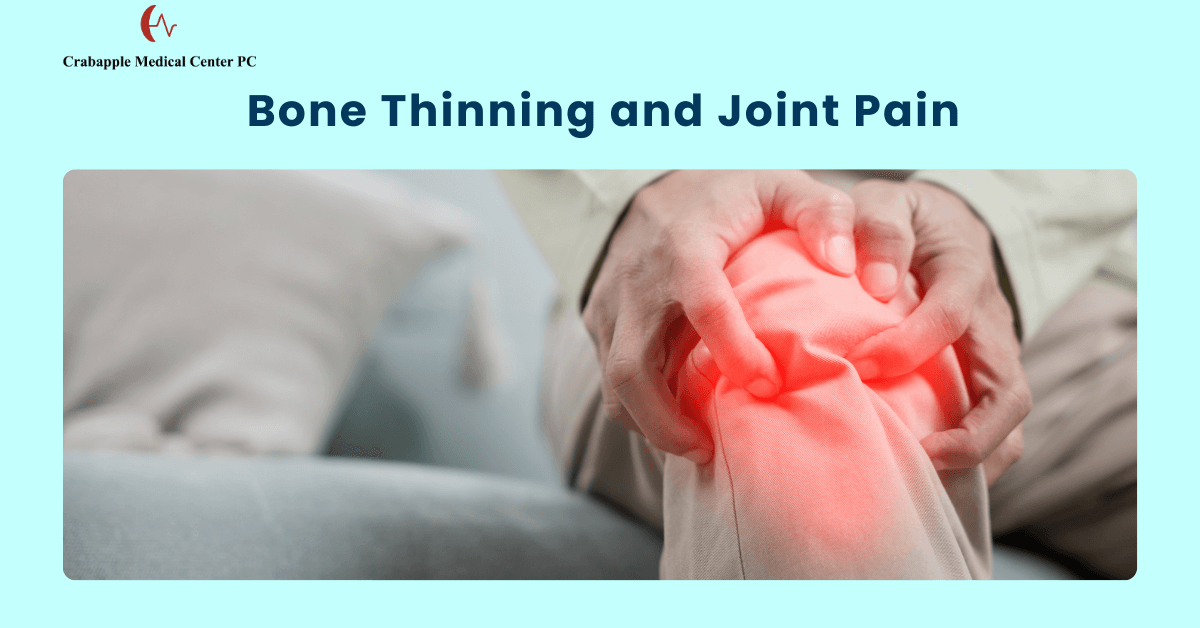Menopause is a natural phase in every woman’s life, marking the end of her menstrual cycles and fertility. For many women, this transition is accompanied by physical, emotional, and hormonal changes that can sometimes feel overwhelming. Understanding menopause, its symptoms, and how to manage this important life stage with the right care is essential for maintaining overall health and well-being. At Crabapple Medical Center Alpharetta GA, we offer comprehensive care for women navigating menopause, providing personalized treatment plans to address their unique needs and concerns.
This blog explores the menopause transition, common symptoms, and effective management strategies. From hormone therapy to lifestyle changes, we’ll dive into how primary care and specialized support can help women manage menopause with confidence, ease, and empowerment.
What is Menopause?
Menopause is the time in a woman’s life when her ovaries stop producing eggs, and her body experiences a decline in the production of estrogen and progesterone. This biological process typically occurs between the ages of 45 and 55, though it can vary. A woman is considered to have reached menopause when she has gone 12 consecutive months without a menstrual period.
The transition to menopause, also called perimenopause, can begin years before the actual cessation of menstruation. During this phase, women may experience a variety of symptoms as their body adjusts to changing hormone levels. These symptoms can vary widely from woman to woman, with some experiencing only mild discomfort, while others may face more significant challenges.

Phases of Menopause
Menopause can be broken down into three distinct phases:
1. Perimenopause
Perimenopause is the period leading up to menopause, typically starting in a woman’s 40s, but it can begin earlier. This phase is characterized by fluctuating hormone levels, which can cause irregular periods, hot flashes, and other symptoms. Women may also experience changes in sleep patterns, mood swings, and weight gain during perimenopause.
2. Menopause
Menopause officially begins after 12 consecutive months without a menstrual period. During this stage, a woman’s ovaries have stopped releasing eggs, and estrogen and progesterone levels are significantly reduced. This phase may bring about symptoms such as hot flashes, vaginal dryness, and thinning hair.
3. Post menopause
Post menopause refers to the years after menopause has occurred. While many of the symptoms of menopause may subside, women can still experience long-term effects of hormone loss, including bone thinning and changes in cardiovascular health. This phase requires ongoing care to manage the long-term risks associated with menopause.
Take Control of Your Menopause Journey
Empower yourself with the right care and support to manage menopause and maintain a healthy lifestyle.
Common Symptoms of Menopause
Menopause affects every woman differently, and symptoms can vary greatly in both type and severity. Here are some of the most common symptoms women experience during the menopause transition:
1. Hot Flashes and Night Sweats
One of the hallmark symptoms of menopause, hot flashes are sudden, intense feelings of heat that can cause sweating and discomfort. They can occur at any time of day or night. Night sweats are hot flashes that occur during sleep, often disrupting a woman’s rest.
2. Irregular Periods
Before menopause, many women experience changes in their menstrual cycles, including lighter or heavier bleeding, longer or shorter cycles, and skipped periods. These irregularities are typically a sign of the body’s transition to menopause.
3. Mood Swings and Irritability
Fluctuating hormone levels can cause mood swings, irritability, and even depression. Women may experience feelings of anxiety or sadness, which can be exacerbated by other menopause symptoms like sleep disturbances and hot flashes.

4. Sleep Disturbances
As hormone levels fluctuate, many women have trouble sleeping. Hot flashes and night sweats can make it hard to stay asleep throughout the night, leading to fatigue and irritability during the day.
5. Weight Gain and Changes in Body Composition
With the decline in estrogen production, women may notice changes in their metabolism, leading to weight gain, especially around the abdomen. This can be frustrating for many women and may require adjustments to diet and exercise routines to maintain a healthy weight.
6. Vaginal Dryness and Discomfort
The reduction in estrogen during menopause can lead to vaginal dryness, which may cause discomfort during intercourse and increase the risk of urinary tract infections. This is a common but often under-discussed symptom of menopause.
7. Memory and Cognitive Changes
Many women report experiencing memory lapses, difficulty concentrating, or a sense of mental fog during menopause. While these cognitive changes can be distressing, they are often temporary and linked to hormonal changes.

8. Bone Thinning and Joint Pain
Decreased estrogen levels can lead to a loss of bone density, increasing the risk of osteoporosis and fractures. Joint pain and stiffness are also common during menopause, and women may feel more discomfort in their joints.
How Crabapple Medical Center Can Help?
At Crabapple Medical Center, we understand the challenges women face during menopause. Our experienced healthcare providers are committed to offering personalized care that addresses the physical, emotional, and hormonal changes associated with this life stage. We offer a range of services to help manage symptoms, improve quality of life, and reduce the risks associated with menopause.
1. Hormone Replacement Therapy (HRT)
Hormone Replacement Therapy (HRT) is one of the most common treatments for managing menopausal symptoms. HRT works by replacing the hormones that the body no longer produces during menopause. This treatment can help relieve hot flashes, night sweats, vaginal dryness, and mood swings.
At Crabapple Medical Center, we provide personalized HRT plans that are tailored to each patient’s needs. We will work with you to assess your symptoms, medical history, and personal preferences to determine the most effective treatment approach.
2. Lifestyle and Dietary Modifications
Maintaining a healthy lifestyle during menopause is essential to managing symptoms and improving long-term health. At Crabapple Medical Center, we provide guidance on nutrition, exercise, and stress management to help you navigate the menopause transition. Regular physical activity, a balanced diet rich in calcium and vitamin D, and strategies for managing stress can help reduce the severity of menopause symptoms and improve overall health.
Our team can help you develop a tailored plan that includes:
- Exercise routines to maintain a healthy weight, build muscle mass, and improve cardiovascular health.
- Dietary recommendations to support bone health, manage weight, and improve energy levels.
- Mindfulness and relaxation techniques to reduce stress and improve mental clarity.
3. Mental Health Support
The emotional and psychological changes that accompany menopause can be overwhelming. From mood swings to feelings of anxiety or depression, it’s important to address mental health during this transition. Our team at Crabapple Medical Center offers counselling and support to help women manage the emotional challenges of menopause.
Whether you’re dealing with mood swings, stress, or depression, we provide a safe space to discuss your concerns and explore coping strategies. We may recommend therapy, support groups, or even medication, if necessary, to ensure you have the mental and emotional support you need.
4. Bone Health Management
Osteoporosis and bone thinning are common concerns during menopause due to the decrease in estrogen. At Crabapple Medical Center, we monitor bone health through bone density testing and provide guidance on how to reduce the risk of fractures. Our bone health management strategies include:
- Calcium and vitamin D supplementation to promote bone strength.
- Exercise recommendationsto improve bone density, such as weight-bearing exercises and resistance training.
- Medications that may help prevent bone loss.
5. Preventive Care and Screening
Menopause is also an excellent time to focus on preventive care and screening for other health concerns. Women are at an increased risk for heart disease, diabetes, and certain cancers during and after menopause. Our healthcare providers offer:
- Routine screenings for cholesterol, blood pressure, and glucose levels.
- Mammograms and Pap smears to detect early signs of breast cancer and cervical cancer.
- Heart health assessments to reduce the risk of cardiovascular disease.
Managing Menopause: A Holistic Approach
At Crabapple Medical Center, we believe in a holistic approach to managing menopause. Rather than focusing solely on treating individual symptoms, we consider the physical, emotional, and mental aspects of this transition. Our team works with you to develop a comprehensive plan that aligns with your goals and lifestyle.
We take the time to listen to your concerns, answer your questions, and provide personalized care that supports your overall well-being. Whether it’s through medication, lifestyle changes, or emotional support, we are here to help you manage menopause and embrace this new chapter in life with confidence.
Embrace the Change with Crabapple Medical Center’s Support
Menopause is a natural part of every woman’s life, but that doesn’t mean it has to be difficult to manage. With the right care and support, women can navigate this transition smoothly and live healthy, fulfilling lives. At Crabapple Medical Center, we are committed to offering comprehensive care for women in transition. Our team is here to provide personalized treatment options, emotional support, and lifestyle guidance to ensure that you remain healthy and confident during this time.
If you are approaching menopause or are already navigating this phase of life, we encourage you to visit Crabapple Medical Center for a consultation. Together, we can develop a plan to support your health and well-being as you transition through menopause and beyond.
Stay Healthy Through Menopause
Explore personalized treatment options and guidance to navigate menopause with confidence and ease.
Frequently Asked Questions
What are the common symptoms of menopause?
The most common symptoms of menopause include hot flashes, night sweats, mood swings, irregular periods, sleep disturbances, vaginal dryness, and weight gain. These symptoms can vary from woman to woman, and at Crabapple Medical Center, we offer personalized care to help you manage these changes and improve your quality of life.
How can Crabapple Medical Center help manage menopause symptoms?
At Crabapple Medical Center, we provide comprehensive care for managing menopause, including hormone replacement therapy (HRT), lifestyle recommendations, and emotional support. We work with you to develop a personalized treatment plan based on your symptoms, health history, and preferences, ensuring that you feel supported throughout the transition.
Are there non-hormonal treatments for managing menopause symptoms?
Yes, there are non-hormonal treatments available for managing menopause symptoms. These include lifestyle changes, medications to relieve specific symptoms like hot flashes, and natural remedies such as dietary changes and stress management techniques. At Crabapple Medical Center, we offer a range of non-hormonal treatments and will work with you to find the best approach.
How can lifestyle changes help manage menopause symptoms?
Lifestyle changes such as regular exercise, a balanced diet rich in calcium and vitamin D, stress management, and adequate sleep can significantly reduce the severity of menopause symptoms. Crabapple Medical Center can provide guidance on diet, exercise, and stress-reduction techniques to help you feel better during menopause.
Is menopause related to other health conditions like osteoporosis or heart disease?
Yes, menopause can increase the risk of conditions such as osteoporosis and heart disease due to a decrease in estrogen levels. At Crabapple Medical Center, we monitor your bone health, cardiovascular health, and other potential risks as part of our comprehensive menopause care. We provide preventive care and treatments to protect your long-term health.

